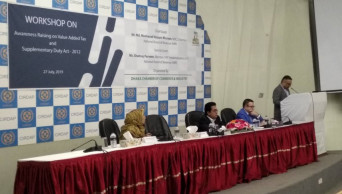businessmen
Big businessmen, not common people, are responsible for loan default: President
Dhaka, Feb 25 (UNB)- President Abdul Hamid on Saturday said common people are not responsible for even one percent of defaulted loans from banks while big businessmen and industrialists willfully take loans with an intention of not paying back.
"They take loans (with an intention) not to pay. Of course, some bankers are also involved with it," he said at the sixth convocation of Jahangirnagar University.
At present, the country’s banks and other lending institutions have more than Tk 1.34 lakh crore in defaulted loan, which is 9.36 percent of the total debt. This is the highest number of defaulted loans so far in the country.
According to Bangladesh Bank, the total debt status of the banking sector at the end of September 2022 stood at Tk 14.36 lakh crore.
Saying that students are the future of the country, Hamid said some will become politicians, some will become businessmen or industrialists, and some bureaucrats.
"Remember that a country moves forward on the path of development and progress only with the coordinated efforts of politicians, businessmen and bureaucrats. Any failure to do so brings extreme danger to the country and the nation,” the President said.
Read: Step up vigilance against militancy, drugs and terrorism: PM Hasina
Referring to news reports of a SAARC country’s bankrupt economy, he said, “Syndicates of bureaucrats, politicians and businessmen have been blamed for this economic bankruptcy. The sinister nexus of this syndicate can spell danger for any country.” He, however, did not name the country.
Calling every student to be educated with ethics, values, patriotism and nationalism in addition to institutional education, he said that a university is the main field of these educations.
“But the sad thing is that in today's politics, power and money play a role as the controlling force in many cases. These evil shadows have spread widely in student politics,” he added.
"Because of encroachment and extortion, student politics is now viewed negatively rather than respected like before. This is not good for our future generations," he said.
Criticising the businessmen, Hamid said that by starting a business, they think how to become rich overnight leaving aside ethics.
Hamid said that the same is equally applicable to the government employees. They are also worried about how to quickly own a car and house after having a job.
"They forget that they are the employees of the republic and servants of the people. For their own small interests, they sometimes do not hesitate to undermine the big interests of the country and the nation,” he said.
Saying that corruption is one of the biggest obstacles in the way of the country’s development and progress, he said that everyone should be aware of corruption, and teachers should keep themselves free from corruption and nepotism.
Hamid said that some vice-chancellors and teachers are busy with attaining their privileges and benefits by misusing law.
Read: President for designing demand-based curriculum
"Each university is governed by its own laws. But sadly, in most universities, a section that misuses law is too busy to obtain their privileges and benefits. They don't hesitate to use universities and students to retain power," he said.
He said that education cannot be compromised in any way and students can do politics, social service, cultural activities after maintaining all academic activities.
"It is unfortunate, but it is true that in most of the universities of the country, more time is being given to non-academic activities by compromising education. That is why the country's universities are not found in the first 1000 universities in the world ranking. The development of the country is not possible with only certificate-based education," he said.
A total of 15,219 of the 31,716 eligible graduates from the 39th to the 47th batch of the university have registered under honours, master’s, M phil, PhD, MBA degrees and weekend courses.
The university awarded 15 graduates with Asadul Kabir Gold Medal and Sharafuddin Gold Medal in the convocation for their outstanding academic results.
The first convocation of Jahangirnagar University was held in 1997, the second in 2001, the third in 2006, the fourth in 2010 and the fifth convocation of the university was held on February 5, 2015
3 years ago
Envoy urges Bangladeshi businessmen to visit Romania to boost bilateral business ties
Romanian Ambassador to Bangladesh Daniela-Mariana Sezonov Tane has called upon the Bangladeshi business representatives to visit the southeastern European country to boost bilateral business ties.
Daniela paid a courtesy call on Federation of Bangladesh Chambers of Commerce and Industries (FBCCI) President Md Jashim Uddin on Monday.
The ambassador said her country has progressed a lot in chemical products, machinery, energy, clean energy, and solar power production. "We will conduct gas exploration in the sea by 2026."
However, she also said: "Most of the people from Bangladesh with Romanian visas disappear from the airport to move to other European countries. The Romanian government suffers financial losses for paying the agencies."
Read more: Momen thanks Romania for issuing visas from Dhaka
The FBCCI president said more skilled people could be sent to Romania from Bangladesh if job opportunities with good salaries are ensured. "The concerned ministries would provide the necessary support in this regard."
"Bangladesh has huge potential in the IT sector along with readymade garments, textile, food processing, pharmaceuticals, ceramics, plastic products, jute and jute products," he added.
"About seven lakh people are involved in freelancing. If these freelancers get more work orders, the sector will get a boost. The hiring companies will also get benefitted."
Jashim also urged the envoy to work for strengthening business-to-business (B2B) engagements between Romania and Bangladesh, according to a media release issued by FBCCI.
Read more: 50 Years of Relations: Romania keen to deepen ties with Bangladesh
3 years ago
Find foreign partners for technology transfer, PM tells businessmen
Prime Minister Sheikh Hasina on Sunday called upon the country’s businessmen to find out their foreign partners to utilise their technology and knowledge in the local industries.
“To welcome the foreign investment, I would like to urge the local businessmen to find out your foreign partners. You can utilise their technology and knowledge in our industry. An excellent investment climate prevails in our country. Avail this opportunity,” she said.
The PM said this while inaugurating the 'Made in Bangladesh Week' organised by Bangladesh Garment Manufacturers and Exporters Association (BGMEA) in the city's Bangabandhu International Conference Centre.
The week-long event will end on 18 November 2022, with the theme "Care for Fashion" with an objective to showcase the capability of the country’s apparel sector before the world.
Hasina said the policy of Bangladesh is an investment-friendly one. The duty-free and quota-free access of Bangladeshi products to different foreign markets attracts foreign investors, she said.
Read more: PM opens ‘Made in Bangladesh Week-2022’
“I would like to urge diplomats and foreign businessmen to choose Bangladesh for investment and sourcing for the sake of their business amid a win-win situation,” she said, adding that Bangladesh is one of the most favourable destinations for investment.
The PM said Bangladesh is developing connectivity with South Asia and South East Asia as this region is a huge market due to its large population.
Noting that Bangladesh is setting up 100 economic zones in different parts of the country, she said, “We want local and foreign investment in the 100 zones.”
The PM stressed the need for the development of agriculture goods processing and food processing industry in the economic zones as the demand for agro-goods and food items would never decline in local and foreign markets.
The Prime Minister urged the RMG business leaders to pay special attention to good work environment, wellbeing of the workers and the quality of their products.
“It is essential to ensure the welfare of the workers, production of goods in environment-friendly places, and a healthy and decent life for the workers so that they can concentrate on work. Many of you are worker-friendly. But it is neglected in some places. You will have to pay special attention to it,” she said.
Read more: PM seeks Saudi fuel with deferred payment schedule
She emphasized on taking preparation from now on for the 4th industrial revolution (4IR) by developing skilled human resources and using artificial intelligence in the local industries. “We’ll have to take preparation from now on to face the changes to be caused by the 4IR,” she said.
The PM said the government has already taken steps to develop skilled human resources for the 4IR era and is also creating new entrepreneurs.
She also stressed the need for protecting arable lands, developing environment-friendly industries, and not setting up industries here and there in an indiscriminate way.
Sheikh Hasina, also President of the ruling Awami League, said her party announced its “Charter for Change” (in its 2008 election manifesto) and Bangladesh has truly changed in the last 13 years accordingly.
She said her government has successfully implemented the Vision 2021 and the Perspective Plan-2010-2021 and fulfilled the electoral pledge.
Focusing on the success of the country’s apparel sector, the Prime Minister congratulated the RMG sector as nine out of the world’s top 10 green garment factories are in Bangladesh now.
The Prime Minister thanked foreign investors and buyers and their representatives for their participation in the Made in Bangladesh event even amid the stagnant global business caused by war, sanctions and counter-sanctions.
More than 100 participants from overseas – foreign buyers and investors or their representatives – are taking part in the weeklong event arranged to enhance the market share of Bangladeshi apparel products in the global market.
At the inaugural ceremony, the Prime Minister also unveiled the covers of books titled “The Untold Stories of Bangladesh RMG Industry: Economic, Social and Environmental Good Practices” and “Beauty of Bangladesh.”
PM’s Private Industry and Investment Affairs Adviser Salman F Rahman, BGMEA president Faruque Hassan and International Apparel Federation President Cem Atlan and BGMEA Senior Vice President SM Mannan (Kochi) also spoke at the event.
3 years ago
PM to US businessmen: Tap into Bangladesh’s liberal investment policy
Prime Minister Sheikh Hasina on Thursday invited US businessmen to invest in several sectors of Bangladesh and tap into its liberal investment policy.
“I would like to invite US investors to invest in renewable energy, shipbuilding, automobile, pharmaceuticals, heavy machinery, chemical fertilizers, ICT, marine resources, medical equipment, and COVID-19 vaccine manufacturing in Bangladesh,” she said.
The premier made the call while delivering a speech at the high-level policy roundtable arranged by the US–Bangladesh Business Council at Lotte New York Palace Hotel.
She said Bangladesh has a liberal investment policy, which includes foreign investment protection, tax holiday, remittances of royalty; unrestricted exit policy; full repatriation of dividends, capital on exit and other facilities.
“Distinguished business leaders, let us once again join our hands for a mutually inclusive partnership for sustainable economic growth,” said Sheikh Hasina.
She said Bangladesh is setting up 100 special economic zones (SEZs) and several hi-tech parks in different parts of the country. Having more than 600,000 freelancing IT professionals, Bangladesh is the right destination for IT investments, she added.
“Moreover, skilled human resources at a competitive wage is an added advantage in Bangladesh. Even if required, we would be happy to offer a dedicated ‘Special Economic Zone’ for US investors. I believe, US- Bangladesh Business Council can play a significant role in this direction,” she continued.
Noting that Bangladesh will graduate from LDC status by 2026, the PM said, the country needs adequate support to enhance global competitiveness and export basket. “I am sure that the United States can be our most robust partner in this challenging endeavor,” she said.
Sheikh Hasina said that Bangladesh is a pioneer in South Asia for regional connectivity. The strategic location offers tremendous potential to be an economic hub of the region.
““… Bangladesh is in the middle of a combined market of 4 billion people. Technology and innovation are the keys for fast-track economic growth. Thus, Bangladesh has become the second largest RMG exporter, third-largest producer of vegetables; fourth largest producer of rice; and fifth largest producer of inland fisheries in the world,” she said.
She said Bangladesh would consistently pursue economic diplomacy with its neighbors and global players, including the United States. “We’re continuously improving our physical, legal, and financial infrastructures and enhanced connectivity in the country,” she added.
The premier said completion of the Padma Multipurpose Bridge has enhanced both domestic and regional connectivity, while Dhaka Metro Rail is expected to open in December 2022, which would add faster domestic mobility.
She said Bangladesh achieved an exemplary socio-economic stride in the last 13 years, particularly in the fields of women empowerment, poverty alleviation, nutrition, maternal and child health, primary education, and ICT.
She said the Bangladesh government recognises the necessity of ensuring labour rights in the country. ILO Roadmap provides a clear plan of actions and timeline to address the concerns and suggests remedial measures in the labour sector.
“My government is adequately engaged with the United States and other development partners for continuous improvements in this sector,” she said.
The PM informed that 121 million people received at least two doses of COVID-19 vaccines in Bangladesh. “Thus, our economy has shown great resilience in the face of the pandemic,” she added.
She deeply appreciated the US government for donating more than 75 million COVID-19 vaccines to Bangladesh through COVAX.
Also read: PM Hasina invites US president to visit Bangladesh
3 years ago
Businessmen given highest benefits with objective to create jobs: Finance Minister
Finance Minister AHM Mustafa Kamal has defended his tweaks to the law and budget items to provide businessmen the highest number of benefits in the proposed national budget for the fiscal year 2021-22, under an objective that they would reinvest in business, which would ultimately create more jobs.
He made the remarks while addressing a virtual post-budget press conference on Friday against the background of the Tk. 6,03,681 crore (Tk 6.03 trillion) budget placed Thursday in parliament, equivalent to 17.5 percent of GDP, for which in turn he set a target to achieve 7.2 percent growth in the 2021-22 fiscal.
In the budget, the overall deficit was outlined at Tk 2,14,681 crore, which is 6.2 percent of GDP. Kamal's plan is to meet it by mobilizing Tk. 101,228 crore from external sources, and Tk 113,453 crore from domestic sources. Two-thirds of the domestic financing, Tk. 76,452 crore, Kamal expects from the banking system, and the rest (Tk 37,001 crore) from savings certificates and other non-bank sources.
The revenue income was estimated to be at Tk 389,000 crore, which is 11.3 percent of GDP.
The Finance Minister said he placed the budget to keep the country’s economy on the trajectory of development and growth offsetting the fallout of Covid-19 as in the past.
Also read: New budget unveiled with focus on protecting lives and livelihoods
“This budget will create scopes for attracting new investment, generate new employment, protect the lives and livelihood of the marginalised people, and development. It is our firm belief,” he said.
He said more than 6.1 percent GDP growth is being attained in the outgoing fiscal year. "We’ll be able to attain 7.2 percent-plus GDP growth in the next fiscal year facing the corona situation,” he said.
Responding to a question as to what specific measures were taken to create employment since many people lost their jobs due to the pandemic, the Finance Minister said the top-most priority was given to the promotion of business in the national budget.
“The private sector has to be in the driving seat to generate employment. Government alone cannot create employment,” he said.
Agriculture Minister Abdur Razzak, Planning Minister Abdul Mannan, Bangladesh Bank Governor Fazle Kabir and Senior Secretary at Finance Division Abdur Rouf Talukder and National Board of Revenue (NBR) Chairman Abu Hena Md Rahmatul Muneem also spoke on the occasion.
Mustafa Kamal said many fiscal measures were taken in the budget to ease the business-related laws in order to promote business.
In many cases, taxes were lowered as the government’s main objective is not revenue collection, he said defending his position.
Also read: Allocation in budget for agriculture 'enough' for Dr Razzaque
He said works are going to determine the effect on the poorer sections by the Covid-19. “We have not received the complete data on the issue. Bangladesh Institute of Development Studies (BIDS) and Bangladesh Bureau of Statistics (BBS) have separately been working on the issue.”
The government will take measures after receiving the findings of their studies, he said.
About a question on black money whitening, the Finance Minister said it is "not yet decided" whether the scope will continue or not. That’s why the issue did not come in the budget speech.
He admitted there is a strong argument that the provision goes against equitable justice, although many people are in favor of its continuation. “But things will be clear within a month.”
In some of his strongest comments, he grew adamant to make the point that black money and undeclared money are not the same, as the latter is created due to flaws in the country’s economic system.
Defending the target of achieving 7.2 percent GDP growth, he said the economy has been performing better with huge growth of 39.4 percent in remittances and 13.69 percent growth in export business.
“So, like previous years, it will not be impossible to achieve this target,” he said.
Responding to a question on the country’s military budget, Finance Minister said this is an important sector, but it was not mentioned separately in the budget due to time constraints.
Finance Secretary Abdur Rauf informed that the military budget received an 8 percent higher allocation than the current fiscal year.
4 years ago
Don’t harass businessmen during VAT collection: NBR chief
Dhaka, July 27 (UNB) - National Board of Revenue (NBR) Chairman Mosharraf Hossain Bhuiyan on Saturday asked his officials not to harass businessmen during the collection of Value Added Tax (VAT).
6 years ago
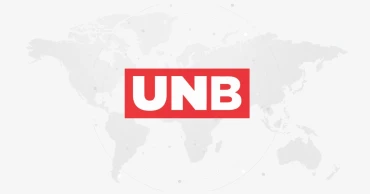
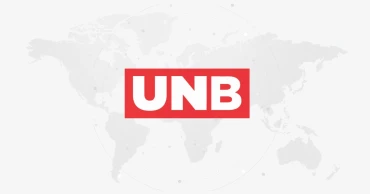
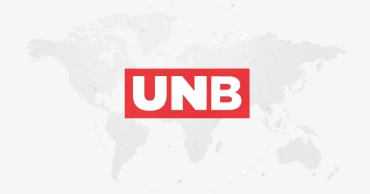
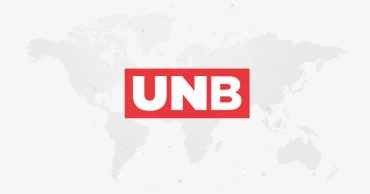
.jpg)
